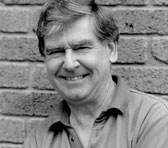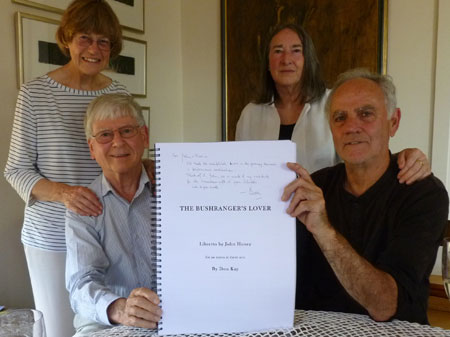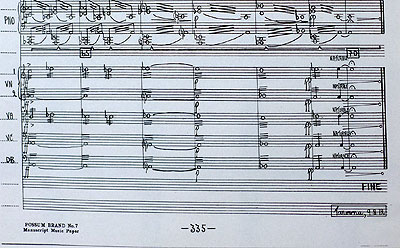24 January 2013
Collaborating with Don Kay
 Image: Don Kay
Image: Don Kay Don Kay, the Tasmanian-based composer of concertos, symphonies, vocal, choral as well as chamber music, turns 80 on 25 January 2013. John Honey, Kay's collaborator and friend, writes about the major works the pair have completed over the past couple of years: two song cycles - Aspects of the Vine and Bird Songs - and the opera The Bushranger's Lover.
Read also: 'Don Kay at 80 - a personal perspective' by pianist-composer Michael Kieran Harvey (Resonate 24 January 2013).
Three years ago Jo St Leon asked me if I'd write some text to form the basis of a musical work that Jane Edwards could sing with the Elanée Ensemble (Jo St Leon, viola; Stuart Thompson, double bass). When I said I'd have a go, Jo asked me whether I had a composer in mind. My choice was Don Kay. Since returning to Hobart from a decade working in America, I'd renewed my acquaintance with Don and his music, and the prospect of collaborating with him excited me. I knew he'd be interested, because he's never been known to resist a musical challenge. But what would the text be about? What form would the work take? Jo's brief was open, and neither Don nor I had an immediate spark.
Don's a generous composer, known for his habit of writing small works for friends, and at exactly this time (early 2010) he wrote a cello-piano piece for me and my wife Maria. It's called ...the soft dying day - an exquisite 'song without words' inspired by John Keats's poem, 'To Autumn'. I wrote the missing words, describing a hot day in a Tasmanian vineyard, with young sweaty pickers harvesting pinot noir grapes, and presented them to Don. We realised we had a subject for the Elanée Ensemble piece - Tasmanian wine, in which I have a long-standing interest. I made a film about the youthful Tasmanian wine industry in 1985, I've consumed a lot of it over the years, and I know many of the stories about its difficult evolution. I was sure I could come up with five further song lyrics on the subject, giving us a cycle of six songs, to be called Aspects of the Vine.

with the opera's dedicatees Frances Kay and Maria Honey at the back.
While I worked on song number two, Don incorporated my lyrics into 'The Soft Dying Day', not, as I expected, simply replacing the cello line with voice, but writing a completely new voice part, and giving the cello line to the viola. The result was the classic 'greater than the sum of the parts', and I knew we were onto something.
Don always warns that 'it might take a while', and then, as a result of discipline, order and application, turns a work out in no time flat. He is of the pre-computer generation, and composes at the piano, by hand. His exquisite calligraphic scores are prized by musicians. As I fed each new lyric to him, he'd go to work, and before I could get the next one done there'd be an A4 manila envelope in my post office box, containing a completed song score.
Aspects was finished by mid-2010, and being on a roll, I suggested to Don that we might do another cycle - six songs about the staple birds that inhabit the bush where my wife Maria and I live south of Hobart. Again, Don was ready to go. I should mention that, at that time, he was 77 years old. He was also very deaf, an affliction he's been dealing with effectively for years. He admits he's luckier than Beethoven in terms of access to audio technology. Nevertheless his achievement in continuing to pour out compositions at his age with his auditory condition is stunning.
Don decided to score Bird Songs for high voice and string quintet - i.e. string quartet plus double bass. The process was the same as for Aspects - I'd deliver a new lyric, and in due time back would come the manila envelope containing a beautifully crafted song score.
During the year it took to produce these two works Don also completed two piano sonatas and a work for saxophone ensemble.
Don and I were now, in early 2011, on the way to having two works under our collaborative belt, and I thought it was time to tackle something really big. Don had written a one-act opera, The Golden Crane, with libretto by the great poet Gwen Harwood, in 1984. I'm no Gwen Harwood, but I am an experienced screen writer and novelist, and in my bottom drawer I had just the material on which to base a dramatic, horrifying, but ultimately uplifting operatic experience. I'd done some development on the story of early Tasmanian bushranger Michael Howe and his Aboriginal lover Black Mary for a movie project that had languished. I showed Don a synopsis, and asked him if he was prepared to commit another large chunk of his precious compositional life to a three-act opera on about the scale of Tosca. Don said he was.
We were aware that it would be unwise to make such a huge commitment if there was little chance of the finished work being performed. And as we all know, getting contemporary Australian opera produced or even performed in concert is tough. In order to make our ambition as achievable as possible I designed the libretto with a practical 'bottom line' of production in mind.
I began writing the libretto in March 2011 and delivered the complete first draft to Don at the end of May. By then Don had finished Bird Songs and was ready to go on the largest work of his life.
Here's a synopsis of the storyline he was about to re-invent and realise in music:
The Bushranger's Lover - synopsis
Act 1
In 1812 a young ex-seaman, Michael Howe, arrives in Hobart Town, transported for highway robbery. He considers his seven-year sentence fair, but when he's assigned as a servant, which he sees as slavery, he absconds and seeks freedom with a gang of bushrangers led by John Whitehead. Howe must swear that in the case of Whitehead's death Howe will cut off his head, to prevent collection of the bounty. Howe agrees, and is accepted into the gang.
Also in the gang is an Aboriginal woman, Black Mary. She's seventeen, and has grown up with a settler family in Hobart, before running away to join the Whitehead gang. She and Michael become lovers. She takes him to her secret hideaway in the hills. They fantasise about one day settling there in freedom.
When Whitehead is mortally wounded in a raid, Howe delivers on his oath, and takes over leadership of the gang with Mary as his lieutenant.
Act 2
Howe runs the gang with naval discipline, using protection racket tactics against the wealthy settlers and helping the poor with the proceeds. Black Mary uses fire as a terror weapon, and brokers co-operation with the Aboriginal tribes. She believes that Howe is her race's only hope of ejecting the British invaders, and restoring the land to the Aboriginal people
Maria Lord is the wife of the richest man in the colony. She's a former convict and a brilliant entrepreneur. She makes a deal with Howe to leave her husband's properties alone. Black Mary is suspicious about what Howe might be receiving in return. She witnesses an act of betrayal in which Howe reveals Mary's secret hideaway to Mrs Lord, claiming it as his own and offering to share it if they become lovers. Mary, devastated, rages against Howe, and convinces the gang to kill him. But Howe and Mary are ambushed by soldiers. As Howe escapes he fires a shot at Mary.
Act 3
In Hobart Town Mary refuses to believe that Howe intended to kill her. She agrees with the Governor to try and bring the fugitive Howe in. He'll be protected, but only if he gives evidence against the settlers who assisted or co-operated with him. If he doesn't, he'll hang. Howe comes in, and is imprisoned.

Maria Lord visits him and tells him that if he gives evidence against her he won't leave prison alive. Howe is a dead man walking. He chooses to escape, to Black Mary's secret place in the hills. He wanders alone, dressed in kangaroo skins, writing his journal of dreams in kangaroo blood, and evading bounty hunters.
Black Mary is employed by the Governor to track him. She could locate Howe at any time, but her love for him causes her to misdirect the search and let him remain free. But others find him. He's killed, and his head is displayed on a pole in Hobart Town.
Howe is mourned by the common people, who saw him as a hero, by Maria Lord, whose pragmatism ended their relationship, and by Black Mary whose hopes for the ejection of the invader are now as dead as Michael.
Black Mary dies. Her last thoughts imagine a life after death with Michael, in her secret place in the hills. She is twenty-three years old.
From page 1 to page 335
Don mapped out a schedule of composition, giving himself eighteen months to complete the task. He began at the beginning of the story, working through the storyline chronologically until he had the vocal parts complete, with a basic sketched accompaniment. This process, containing drama and interaction between characters, was planets away from Don's usual compositional universe.
But what few people these days know about Don is that in his youth he was something of an actor, a good one, and he relished the task of imagining himself into the skin of the characters and realising the drama and emotion of the libretto in music. As librettist who received each new scene as it emerged, I was thrilled to see the extent to which Don 'got' what my words were on about, and interpreted them musically in ways I could never have imagined.
By early 2012 Don was happy that he had completed his initial phase of composition. He was ready to go back to the beginning and begin the huge task of orchestration. We recognised the need to get Don's score onto computer at the earliest possible opportunity. With the assistance of Arts Tasmania, Don was able to employ Mark Buys as copyist. As soon as Don had finished orchestrating Act One Scene One he gave the handwritten score to Mark. We decided that this opening scene, running about 10 minutes, could be a good 'calling card', and Mark did a fabulous job refining his virtual orchestra to perform the score convincingly. Baritone Michael Lampard recorded the roles of Michael Howe and John Whitehead, and the male chorus parts as well. We posted the result on YouTube:
The remainder of the process was as one would expect with Don - efficient, concentrated, punctuated with flights of inspiration and high emotion. My involvement, theoretically finished when I delivered the libretto, ran through the whole process via daily phone calls containing progress reports, discussion of problems, and depending on the season, football or cricket chat.
Don completed the last page of his handwritten score, page 335, on August 9 2012. The full printed score was delivered by Mark Buys in December.
For a while it looked as though the Tasmanian Conservatorium of Music would stage a concert performance in 2013, Don's 80th birthday year. But financial problems and reorganisation within the university have now removed that possibility.
As far as a full production is concerned, the biggest thing in our favour at the moment is that Graeme Murphy loves it, and has undertaken to do whatever he can to get it staged. So we live in hope and do what we can, with the help of a faithful band of true believers, to make it happen. I have no doubt that when it is eventually produced, it will be a major moment in contemporary Australian opera.
Back to the two song cycles. Aspects of the Vine was premiered in Hobart by the Elanée Ensemble and Jane Edwards in early 2011, and will be performed again later this year. Two planned performances of Bird Songs have fallen over, and at the moment it's possible the work will be performed in the UK before it's heard in this country.
Few composers in their 79th and 80th years have produced three works of such scale and quality as Aspects of the Vine, Bird Songs and The Bushranger's Lover. But regardless of quality or the future of the works, our collaborative journey has been a deeply satisfying creative experience.
AMC resources
Don
Kay - AMC profile (biography, work list and other
resources)
CDs of Don Kay's music available through the AMC Shop
Further links
Don Kay - Wikipedia
'Australianness'
in Australian music - a personal view by Don Kay (article
dated 11 November 1998)
© Australian Music Centre (2013) — Permission must be obtained from the AMC if you wish to reproduce this article either online or in print.
Subjects discussed by this article:
John Honey is a Tasmanian-born film director, screenwriter novelist and (very) amateur cellist.
Comments
Be the first to share add your thoughts and opinions in response to this article.
You must login to post a comment.